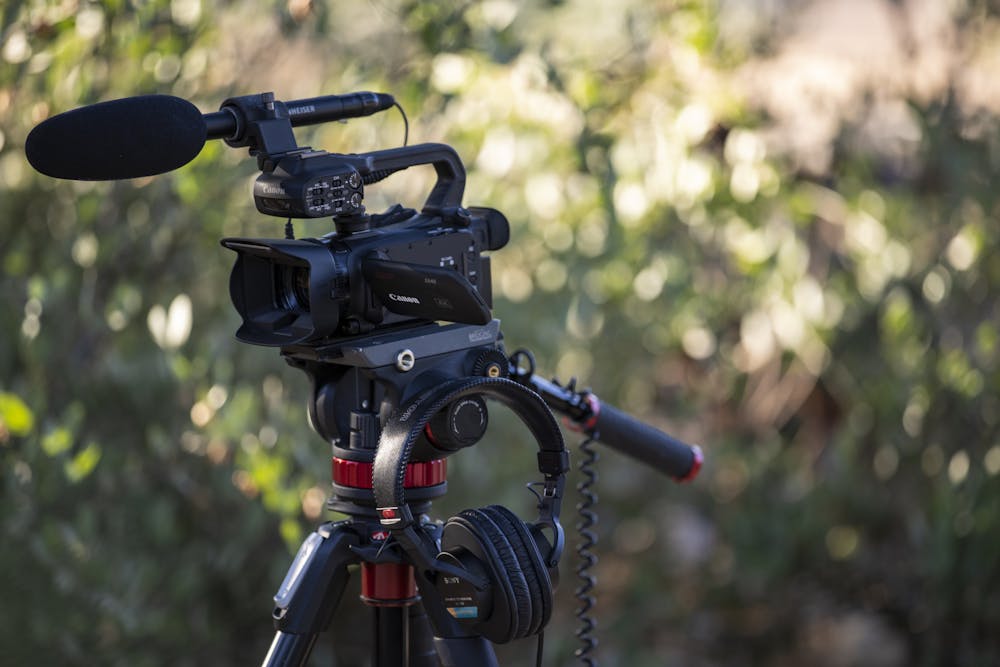Though sensationalism seems to be the norm in mainstream media, documentary filmmaking has always represented a more thorough, honest and ethical depiction of our wild entertainment landscape. Yet the rise of social media and online disinformation has infected media and viewers' media literacy.
Because most documentaries let the interviews tell the story without showcasing the questions, it can create a less direct critique and put a veil in front of the story's intent.
Some documentary styles even function without a preplanned script and let the stories unfold as they're happening. Scriptless, an ASU documentary and reality TV club, brings this philosophy onto campus.
"The main goal of the club from the beginning was to bring that style of filmmaking into the film community and broaden everyone's horizons," Tyler Kupfer, a junior studying film and media production and co-founder of Scriptless, said. "Documentaries are probably perceived as more objective than they should be. Because no matter what it is, there's always going to be a filmmaker behind it."
"You're supposed to do it as neutrally as possible — so, you can't edit it like a reality show, where maybe someone's a villain, or maybe someone's a hero," Ron Fisher, a sophomore studying film and media production and Scriptless member, said.
Kupfer said that he's not highly confident in the state of ethical storytelling but that he tries to be aware of his own biases as a filmmaker and negate them in his own work.
A recent example of a controversial story and its telling through a documentary is "BS High," an HBO deep dive into the national scandal that was Bishop Sycamore High School and its nationally televised stunt against IMG Academy. It exposed much new information with the whole perspective of Bishop Sycamore head coach and founder Roy Johnson.
Public perception of the incident was relatively lighthearted at the time of the scandal in August 2021, with thousands of tweets, memes and more once the story gained magnitude. However, "BS High" exposes a darker look at the actions taken by Johnson and its impact on the players affected.
"The documentary did a good job of exposing the depth, like how something like this could happen," said Nasha Smith, a Ph.D. student at ASU's Walter Cronkite School of Journalism and Mass Communications.
Smith is also an instructor of ethics and diversity in sports journalism, giving her a particular insight into "BS High."
"Seeing the characters involved, hearing the actual stories from these real people who were impacted, I think it changed perception a bit," Smith said. "We could finally see ourselves and see how somebody could get conned so deeply."
Student-athletes broke into tears when discussing the exploitative behavior they were subjected to, accusing Johnson of lying and manipulative behavior, among other unethical actions. But Johnson gets to tell his side of the story nonetheless.
"With a story so, almost, unbelievable, I think we had to hear from the mastermind, from the manipulator," Smith said. "As an audience, we are treated to the same sort of manipulation as his victims … we can almost see what these people listened to, what they were dealing with."
Lindsey Mean, an associate professor in the School of Social and Behavioral Sciences and the instructor of sports films and documentaries at ASU, said that the documentary displays Johnson's lack of trustworthiness.
"Having the documentary frame and provide extra information is better than just seeing him on Twitter or seeing him on Instagram, in a platform where there is no context," Mean said.
The context was undoubtedly provided. "BS High" often uses Johnson's words to stand in stark contrast to the testimony of those affected. Yet, it’s a tricky balance to strike between criticizing someone and allowing them to potentially further their manipulation scheme.
"They need to show that they're providing pushback, they're providing challenge, and they're looking for that accountability and responsibility from that person," Smith said.
HBO doesn’t just suffer this issue with "BS High," either. The recent release of "Savior Complex" is an even more extreme example. It follows Renee Bach, who set up a missionary in Uganda and was potentially responsible for the deaths of hundreds of children after performing medical care that she was unlicensed to do. Bach's presence as a primary voice in the documentary prompted an influx of criticism for the framing of the documentary.
Sensationalism and a need for clicks have crept into all forms of media. However, there’s still hope that documentary filmmaking can rise above the fluff and stand as a stalwart of objective and fair storytelling.
Smith said pushing media literacy could solve the convoluted world of competing information.
"People don't verify information anymore. We're unfortunately in a very clickbait-heavy, headline-reading cycle right now where people are not apt to read," Smith said. "If we're not actively also seeking out different sources of information, that's also a problem because even if you think you're on the right side of something, you also need to read other things."
Ethically and thoughtfully telling a story is essential to the documentary process, especially when telling sensitive stories.
"Ethical filmmaking needs to be a top priority," Fisher said. "(The genre) definitely has an influence on culture and people, so if you're not making your films ethically, then you really need to reevaluate how you're making your films."
Edited by Claire van Doren, Walker Smith and Caera Learmonth.
Reach the reporter at adirst@asu.edu and follow @andrewdirst on X.
Like The State Press on Facebook and follow @statepress on X.
Andrew is a senior studying journalism and mass communication. This is his fourth semester with The State Press. He has also worked at The Arizona Republic and Cronkite News.




